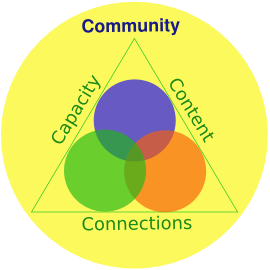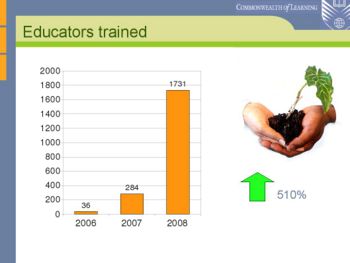L4C Case Study
The purpose of this case study is share WikiEducators' experiences under the Learning4Content[1] (L4C) initiative by:
|
Contents
Overview
Learning4Content is WikiEducator's[2] flagship capacity building project designed to enable teachers, lecturers and trainers in developing wiki skills (specifically Mediawiki[3]) for collaborative authoring of Open Education Resources (OER) -- that is, teaching materials which educators are free to share, remix and reuse.WikiEducator provides free training for educators in return for a small contribution of their knowledge in the form of a donated OER lesson or content resource. L4C is best described as a learn-by-doing project inspired by the North American indigenous proverb: Tell me and I'll forget, show me and I may not remember, involve me, and I'll understand. L4C is likely the world's largest attempt to develop wiki skills for education and this ambitious project aims to:
- conduct 160 workshops
- train 2500 teachers/educators
- develop 2500 lessons of free content.
Learning4Content is global, is designed to scale and has the flexibility to adapt to changing needs and circumstances given its open content license and use of open file formats.
How it works
The Learning4Content project:
|
How L4C links with the WikiEducator strategy
WikiEducator[4] aims to build a thriving and sustainable global community collaborating on the design, development and delivery of a free[5] version of all the content resources and materials used in support of all national education curricula by 2015. Building capacity and skills of the community to engage meaningfully in the mass-collaboration required for the design and development of high quality OER materials is a key component of the WikiEducator strategy[6]. In this way, the Learning4Content project contributes to building a sustainable OER ecosystem in conjunction with the remaining sub-components of our strategy, namely:- building community;
- developing OER content; and
- establishing smart connections with the open source technologies we implement and their respective communities.
OER Training materials
This is a smart project which uses OER training materials to develop capacity in how to develop OERs within a real OER wiki community.
L4C developed twelve tutorials[7] which were designed as self-study materials with integrated activities. This has enabled the project to implement a variety of delivery options, including self-paced learning, online workshops and face-to-face workshops. The wiki platform allows us to: refine and adapt the tutorials on a regular basis, to produce print-based materials using WikiEducator's Wikiwiki==>pdf[8] features; and to host online delivery through the Mediawiki platform. The approach is flexible because L4C facilitators can choose their own delivery technologies for example: Learning Management Systems (like Moodle[9]); discussion forum engines (like Google Groups[10]) or provide all training directly on the wiki.
The skills covered in the training materials are closely linked with WikiEducator's optional community certification[11] system whereby the community acknowledges achievement of individual skills on the path to becoming a Wikimaster.
The model
Participants are encouraged to sign a voluntary learning contract[12] whereby they commit to donating a little of their knowledge back to the community by developing a free content lesson or resource. The conversion rate is surprisingly high with 55% of Learning4Content participants signing and submitting their learning contracts. While the learning contract is not legally enforceable it nonetheless encourages participants to make a concrete commitment to the open education movement.
The L4C project is co-funded by the William and Flora Hewlett Foundation[13] and the Commonwealth of Learning[14]. L4C has adopted a bounty model[15] for identifying potential facilitators and the requirements for the bounty of CAD$1000. Potential facilitators submit an expression of interest to organise and present an L4C workshop. Facilitators are required to organise and identify a host institution to provide access to a computer laboratory and recruit a minimum of 15 participants for each face-to-face workshop. We have also succeeded in scheduling at least one online L4C workshop per month for the duration of the project. Numerous L4C graduates have become facilitators of their own workshops and we have a growing number of institutions and individuals who have presented L4C workshops without claiming or expecting a bounty for their efforts.
The Learning4Content project is a low cost model which is scalable because:
- All training materials and facilitors' guides[16] are available as OER;
- Training costs are limited to an honorarium of CAD$1000 per workshop;
- Learning4Content workshops require commitment from local institutions for providing access and contributions in kind for the computer laboratory and local catering costs;
- The Learning4Content project identifies new facilitators through a train-the-trainers approach to expand and scale-up capacity development a global scale;
- The WikiEducator community has the critical mass to identify and attract large numbers of prospective trainees.
Outputs achieved to date
Commencing in January 2008, the Learning4Content project set out to train 2500 educators. L4C has achieved 91% of its targeted number of educators trained by March 2009. L4C has resulted in increasing the number of educators trained by 510% when compared to the previous calendar year.As of the end of March 2009, the project had enrolled and trained 2,326 educators (1,094 through face-to-face workshops and 1,232 through online workshops) and has succeeded in achieving impressive results with regard to gender parity in ICT skills development -- historically dominated by a male bias in ICT training interventions. In the case of the Learning4Content project, gender parity has been a high priority as demonstrated by the results: 53% Male and 47% Female.
L4C has succeeded in scheduling an average of one workshop each week for the duration of the project. The online versions of the Learning4Content project draw participants from all corners of the globe and face-to-face workshops have already been conducted in 30 different countries: Bangladesh, Barbados, Belize, Botswana, Canada, Cameroon, Israel, India, Ghana, Grenada, Guyana, Kenya, Kingdom of Tonga, Lesotho, Malaysia, Mozambique, Namibia, Nauru, New Zealand, Pakistan, Papua New Guinea, Samoa, Saint Kitts & Nevis, Seychelles, Solomon Islands, Sri Lanka, Trinidad and Tobago, Tuvalu, Uganda and Zambia. The Gambia, and Nigeria are in the final preparation phases for scheduling in-country workshops.
Localisation of L4C tutorials has commenced with translations for French[17] and Portuguese[18] available and work on the Spanish[19] translation under way.
Lessons learned
Content coming soon ...
- Scalability. The model for the training is scalable. Improvements have been made to the tutorials based on feedback, but the general format is essentially unchanged.
- Facilitated workshops - completion rates? activities of facilitators - what do they do that works? Cohort model - benefits? Number of lesson, daily modules. Participant suggestions and feedback.
- Community building and participation beyond the workshops - stay on for WE groups discussions, council...
Reflections for the future
Content coming soon ....
- Promoting the ideas and the available L4C training are ongoing activities. Most educators who could and would create and use open educational resources are not aware of wikis, WikiEducator or the Learning4Content training. The dramatic increase in the number of participants indicates that as the information spreads, the up-take is remarkable. The current participants are "early adopters" and hint at the likely interest as the larger population of educators discovers the benefits of using OERs, wikis and WikiEducator capabilities.
Links and references
- ↑ http://www.wikieducator.org/Learning4Content
- ↑ http://www.wikieducator.org
- ↑ http://www.mediawiki.org/
- ↑ http://www.wikieducator.org/WikiEducator:About
- ↑ http://www.wikieducator.org/Wikieducator_tutorial/What_is_free_content/Free_content_defined
- ↑ http://www.wikieducator.org/WikiEducator:About#Strategy
- ↑ http://www.wikieducator.org/Help:Contents
- ↑ http://www.wikieducator.org/WikiPublishing
- ↑ http://www.moodle.org
- ↑ http://groups.google.com/
- ↑ http://www.wikieducator.org/WikiMaster
- ↑ http://www.wikieducator.org/Learning4Content/Learning_contract
- ↑ http://www.hewlett.org/Programs/Education
- ↑ http://www.col.org
- ↑ http://www.wikieducator.org/WikiEducator:Bounties
- ↑ http://www.wikieducator.org/Learning4Content/Facilitators
- ↑ http://fr.wikieducator.org/Tutoriel_WikiEducator
- ↑ http://www.wikieducator.org/Tutorials_in_Portuguese
- ↑ http://es.wikieducator.org/Tutorial
Comments from Colleagues
- I suggest that the first time you use an acronym, in this case, OER, you put the full name in parenthesis so newbies like me can learn them.--Philbartle 10:32, 22 March 2009 (UTC)
- >> Done --Wayne Mackintosh 23:04, 22 March 2009 (UTC)


